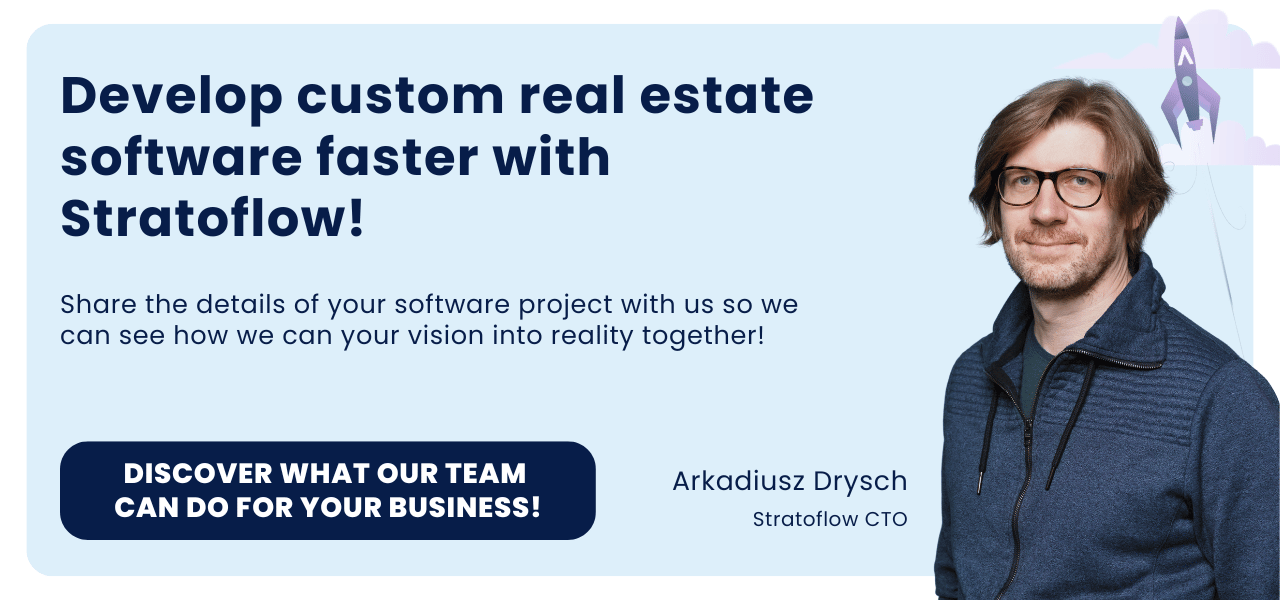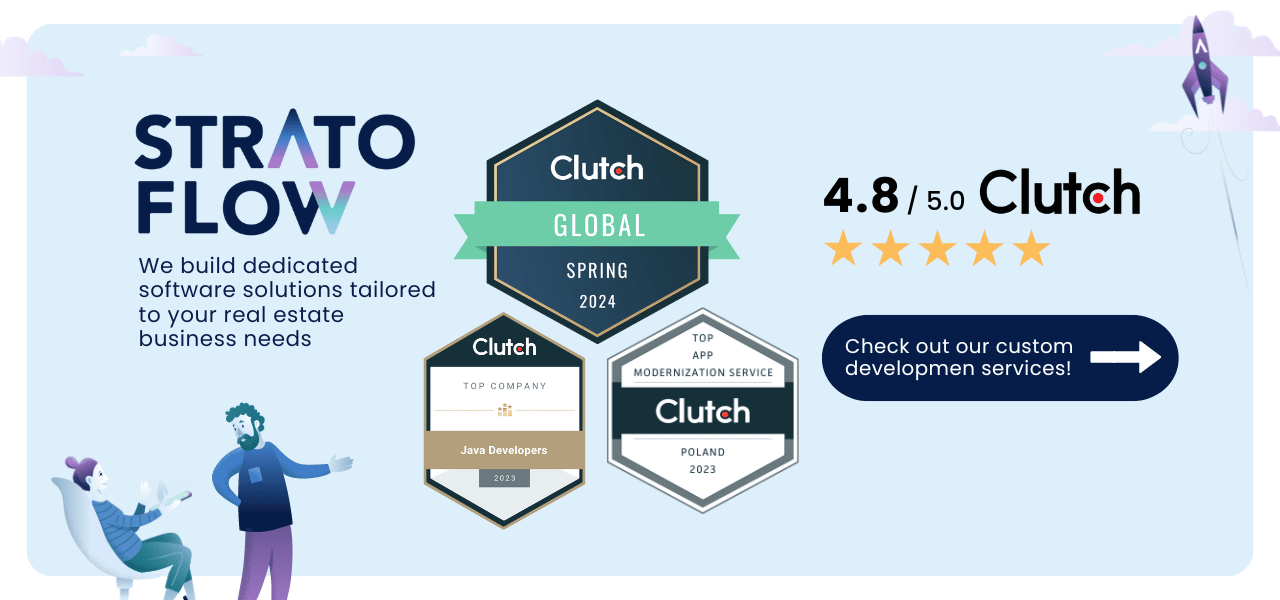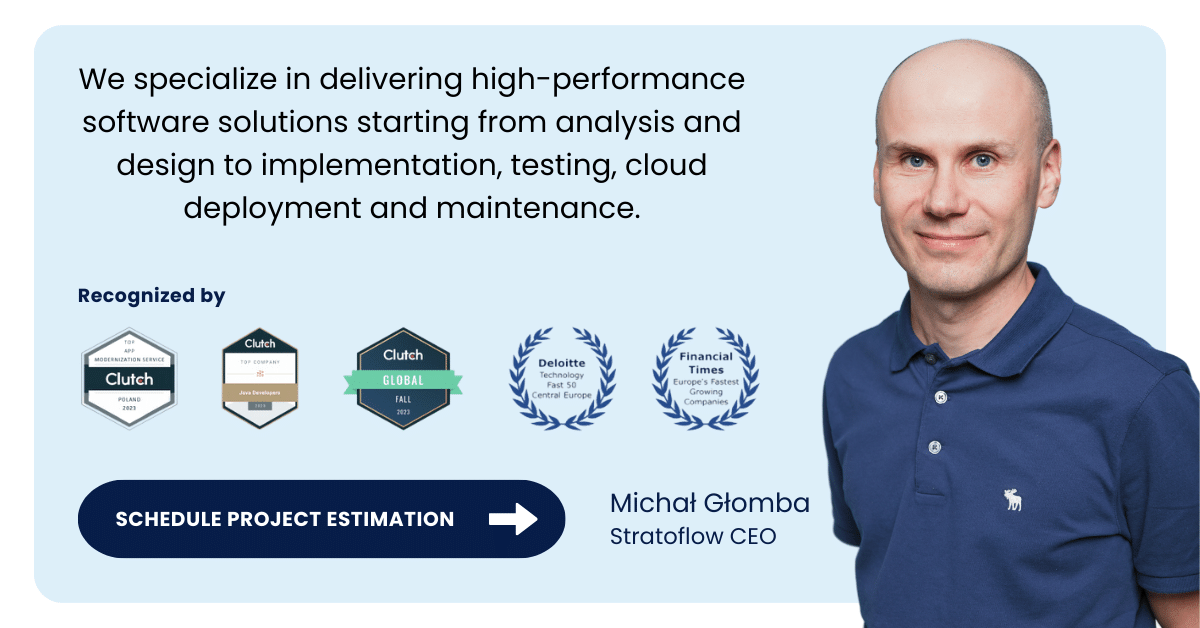
Your Guide to Property Management Software Development
Real estate professionals often struggle to find a property management system that fits their company’s unique needs.
Off-the-shelf solutions may lack the flexibility, scalability, and specific functionality required for optimal performance.
This guide explores how a solid custom real estate software development company can address these challenges and deliver tailored solutions that improve efficiency, compliance, and tenant satisfaction.
By leveraging platforms like Openkoda and the expertise of Stratoflow, real estate companies can achieve high-performance, future-proof software that is designed to meet their exact needs.
Contents
- What is a Property Management System (PMS) and Why do You Need One?
- Why create new property management software?
- Must have features of property management system software
- Traditional custom property management software development process
- Boosting the property management software development process with Openkoda
- Our Property Management Software Development Services
What is a Property Management System (PMS) and Why do You Need One?
A Property Management System (PMS) is an essential tool for the modern real estate industry.
This software application is designed to help property managers streamline and automate various operations related to managing real estate properties. From handling tenant communications, tracking maintenance tasks and processing payments to managing leases and generating financial reports, a PMS serves as the backbone of efficient property management.
But why is a PMS essential?
In an increasingly competitive market, the ability to streamline operations, improve tenant satisfaction, and gain real-time insight into property performance can make all the difference.
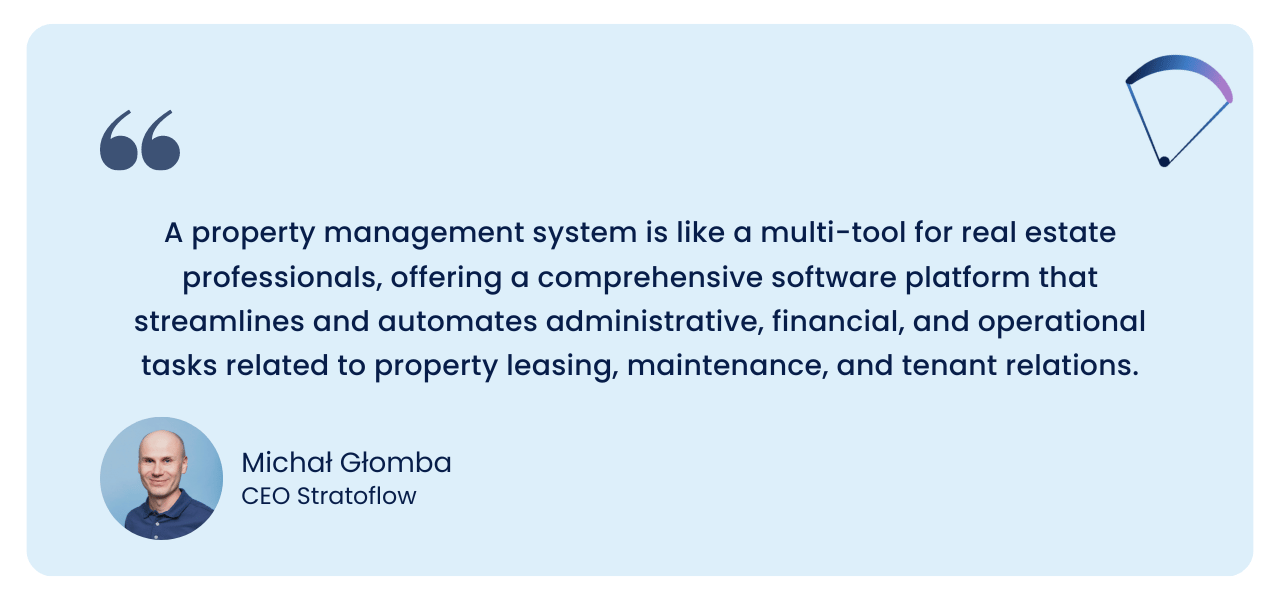
For instance, have you ever struggled with disorganized records or missed maintenance requests?
A PMS can solve these problems by keeping all data in one place, accessible at any time.
This not only improves efficiency but also reduces the risk of errors. The system can automatically schedule and track maintenance tasks, ensuring that no request is overlooked and that properties remain in optimal condition.
Furthermore, effective tenant communication is crucial for maintaining high occupancy rates and tenant satisfaction.
A PMS enables seamless communication between property managers and tenants, offering features like automated reminders for rent payments, notifications for maintenance schedules, and a portal for tenants to submit requests or complaints.
These are only a few areas where property management software can be introduced but one thing is for sure – this level of organization and responsiveness can significantly enhance tenant experience and retention, leading to both much better business efficiency and conversion rates.
With custom property management software, businesses can tailor solutions to their specific needs, further optimizing efficiency and operational control.
Why create new property management software?
But at this point you may be asking yourself.
Why create new property management software when there are so many off-the-shelf tools available?
While off-the-shelf solutions offer a range of features, they often fall short in addressing the unique needs and challenges faced by individual real estate companies.
Investing in customized residential or commercial property management software can provide significant benefits that are specifically tailored to your business needs.
Going for that perfect fit
First, a customized property management system ensures a perfect fit with your business processes.
Every real estate company operates differently, with specific workflows, tenant interactions and operational priorities.
Off-the-shelf software may offer a wide range of features, but it often lacks the flexibility to adapt to unique business models.
A custom PMS can be designed to perfectly align with your company’s processes, improving efficiency and effectiveness.
Taking care of compliance issues
Second, compliance with local regulations is a critical aspect of property management that can vary significantly from region to region.
Off-the-shelf solutions may not adequately address the specific legal and regulatory requirements relevant to your location.
A customized property management system can be built with these local regulations in mind, ensuring that your company remains compliant and avoids potential legal issues.
This level of customization can include automated updates to keep up with changing laws, minimizing the risk of non-compliance.
Future-proofing your system
Plus, custom software allows for greater scalability and future-proofing.
As your real estate business grows, so will your property management needs.
Custom software can be designed with scalability in mind, allowing for easy updates and the addition of new features as needed.
This ensures that your PMS will continue to meet your needs over time, providing long-term value and reducing the need for frequent software changes.
Must have features of property management system software
As we have seen, there are unique benefits to choosing a custom property management system.
But what features must such a system have to maximize these benefits?
Well-designed custom property management systems should include a comprehensive set of features tailored to the specific needs of property management companies.
Here are the key features that every custom property management system should have:
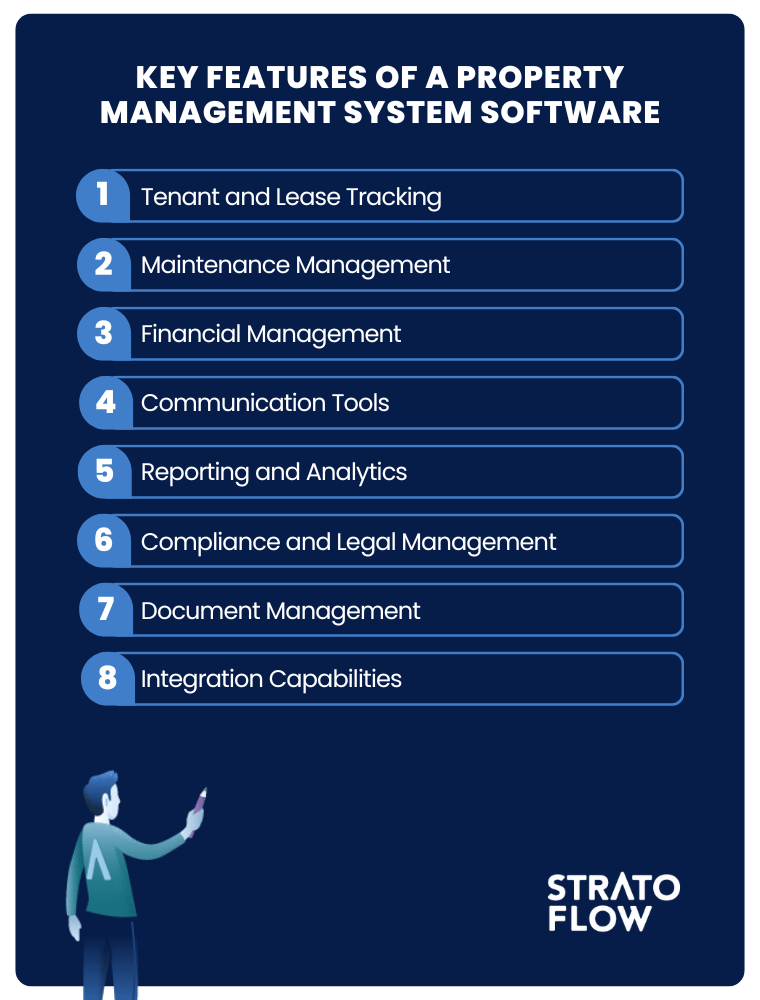
- Tenant and Lease Tracking: Keep detailed records of tenant information, lease agreements, and rental histories. This feature ensures that all relevant data is easily accessible and up-to-date.
- Maintenance Management: Automate maintenance requests, track progress, and schedule regular inspections. This helps in ensuring timely repairs and upkeep, maintaining property value and tenant satisfaction.
- Financial Management: Manage rent collection, expenses, and financial reporting. This feature provides accurate financial data, helping property managers make informed decisions and maintain financial health.
- Communication Tools: Facilitate seamless communication between property managers and tenants. This includes automated reminders, notifications, and a portal for tenants to submit requests or complaints, enhancing tenant engagement and satisfaction.
- Reporting and Analytics: Generate detailed reports and analytics on various aspects of property management in software such as hotel management systems, such as occupancy rates, financial performance, and maintenance activities. This helps in identifying trends, making data-driven decisions, and improving overall operations.
- Compliance and Legal Management: Ensure that all property management activities comply with local regulations. This includes automated updates for changing laws and tools for managing legal documentation and processes.
- Document Management:
- Integration Capabilities: Seamlessly integrate with other business systems such as accounting software, real estate CRM, and marketing platforms. This ensures a smooth flow of information and eliminates the need for redundant data entry.
- Scalability: Design the system to grow with your business, allowing for easy updates and the addition of new features as needed. This ensures that the PMS continues to meet your evolving requirements.
- User-Friendly Interface: Provide an intuitive and easy-to-use interface for both property managers and tenants. This reduces the learning curve and improves user adoption and satisfaction.
By incorporating these must-have features, a customized property management system can provide a robust, flexible and efficient solution tailored to the unique needs of real estate companies, ultimately leading to better performance and tenant satisfaction.
[Read also: A Comprehensive Guide to Digital Transformation in Real Estate]
Traditional custom property management software development process
So how do you develop property management software that meets all industry standards?
The traditional custom property management software development process involves several key steps designed to ensure that the final product meets the specific needs of a real estate company.
This process begins with a thorough analysis of business requirements, followed by detailed planning and design, development, testing, and deployment.
Each of these steps is critical to creating a robust and effective system, but the process can be lengthy and costly.
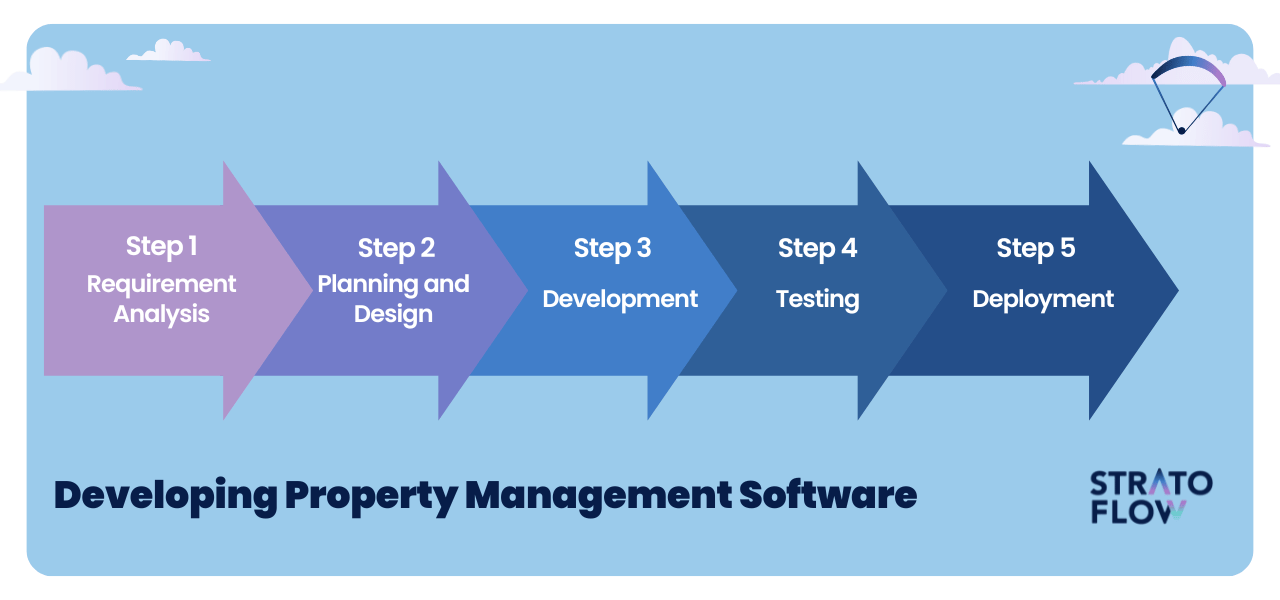
Phase 1: Requirement Analysis
This initial phase involves gathering detailed information about the business requirements and defining the scope of the project.
It includes discussions with stakeholders to understand their requirements and expectations.
Phase 2: Planning and Design
In this phase, the software architecture is designed based on the gathered requirements.
This includes creating wireframes, user interface designs, and defining the technology stack to be used.
Phase 3: Development
The actual coding and development of the software take place in this step.
Developers build property management software according to the design specifications, ensuring that all features and functionalities are implemented correctly.
Phase 4: Testing
Once the development is complete, the software undergoes rigorous testing to identify and fix any bugs or issues.
This ensures that the system is reliable and performs as expected.
Phase 5: Deployment
After successful testing, the software is deployed into the production environment.
This phase involves configuring the system for live use and training end users on how to use it effectively.
While this traditional process ensures a high quality custom solution, it can be both time consuming and expensive.
Developing custom software from scratch requires a significant investment of time, money, and resources.
In the next section, we will explore an alternative approach that can reduce these costs by 65%, making custom property management software development more accessible to real estate companies.
Sound interesting?
Then let’s discover the future of custom property management software development.
[Read also: 10 Key Proptech Trends in 2024: How Technology is Changing The Real Estate Industry]
Boosting the property management software development process with Openkoda
The traditional custom property management software development process can be lengthy and costly, often requiring a significant investment of time, money and resources.
However, leveraging platforms like Openkoda can significantly speed up this process and reduce costs by up to 65%.
Openkoda is an AI-powered, open source platform that provides pre-built application templates, including a comprehensive property management software template.
This template serves as a solid foundation, equipped with the essential features and architecture needed for effective property management.
By using Openkoda, real estate companies can quickly build and customize their property management systems without having to start from scratch.

How Openkoda Accelerates Development
Openkoda combines the power of pre-built application templates with AI-driven customization to provide a flexible and scalable platform that significantly reduces real estate software development time and costs.
Here’s how Openkoda speeds up the development process:
- Pre-built Templates: Openkoda offers pre-built templates specifically designed for property management. These templates include fundamental features such as tenant and lease tracking, maintenance management, financial reporting, and communication tools, which can be readily customized to fit specific business needs.
- Open-Source Core: Openkoda’s open-source nature provides significant flexibility and user interface customization options. This allows real estate companies to tailor the software to their specific needs without being locked into vendor-specific constraints. The open-source framework enables seamless integration of additional functionalities and third-party services, ensuring that the system evolves with the business
- Scalability and Flexibility: Software built on Openkoda can be easily scaled and adapted as your business grows. It supports seamless integration with other residential property management software, ensuring that the property management system can evolve with changing needs and technologies.
- Reduced Development Time: By providing a robust starting point and tools for easy customization, Openkoda can reduce development time significantly. This allows real estate companies to implement and start using their custom property management software much faster compared to traditional development methods.
- Cost Efficiency: Openkoda’s approach to software development can lead to substantial cost savings. By cutting down on the time and resources needed for development and leveraging existing templates and AI-driven enhancements, companies can achieve their goals at a fraction of the usual cost.
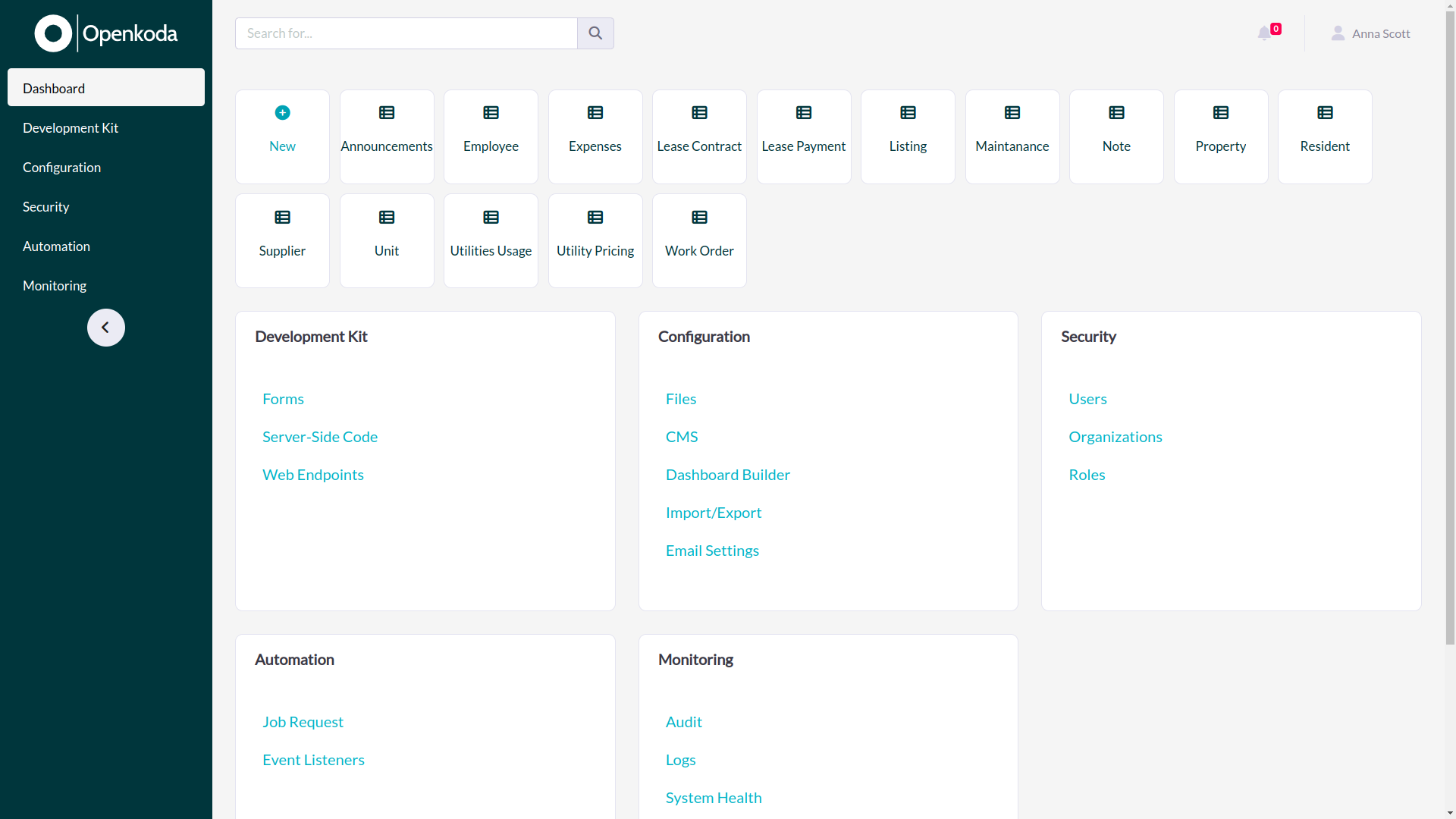
Leveraging Openkoda for rapid property management software development: real-life example
Developing custom property management software using Openkoda is a streamlined and efficient process.
Openkoda property management template provides a robust foundation, complete with core property management functionality and logic that can be easily extended with additional features and API integrations.
Initial setup begins with Openkoda’s out-of-the-box functionality, which includes essential features such as tenant and lease tracking, maintenance management, financial reporting, automated document generation, and communication tools.
These core features ensure that the basic operational needs of a property management system are met from the start, providing a strong foundation upon which to build.
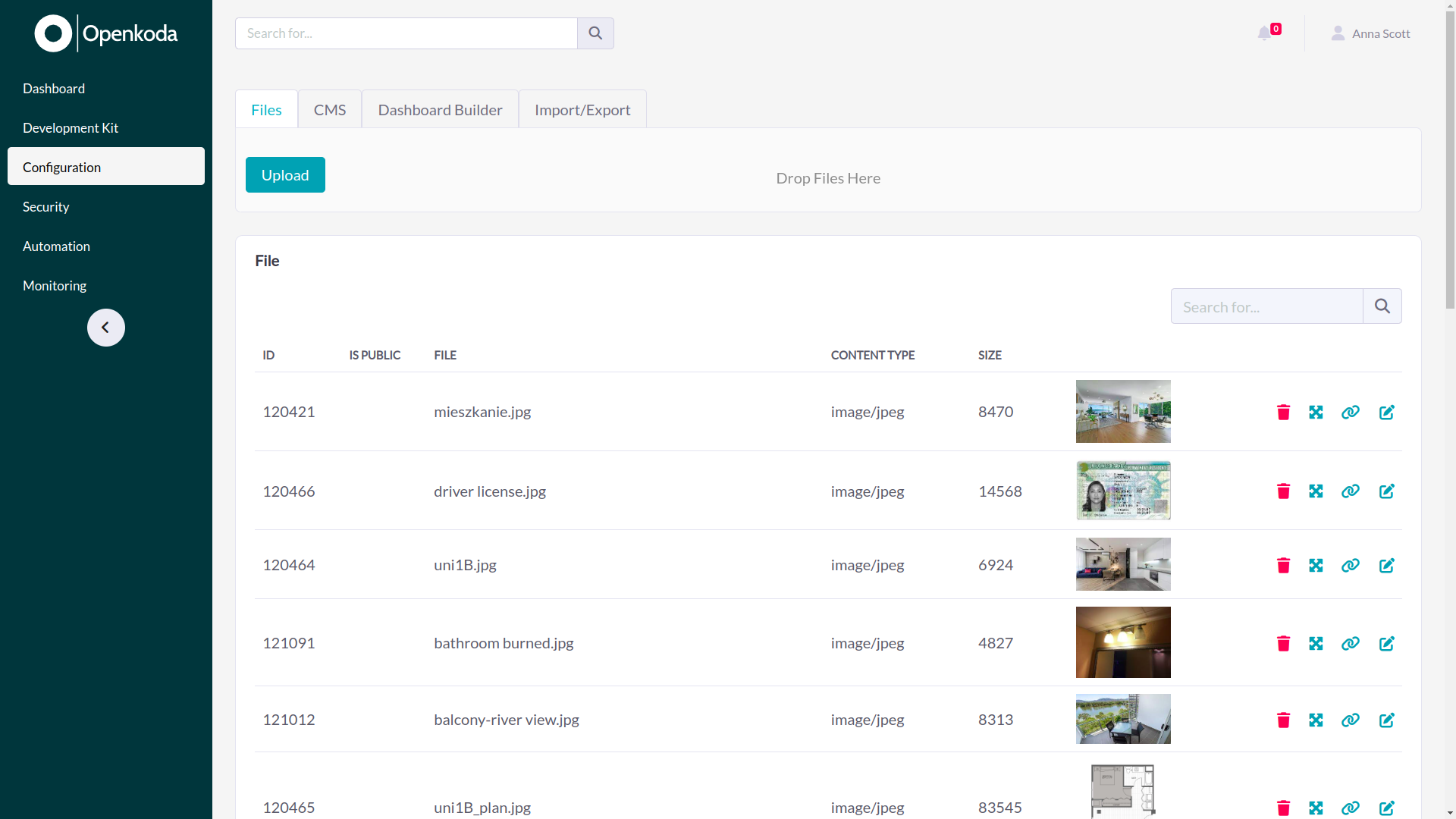
Customization and integration follow the initial setup.
The open source nature of Openkoda allows developers to customize the system to meet specific business needs. This customization can include modifying user interfaces, adding custom workflows, and implementing unique business logic.
For example, if a company requires a specific type of financial report that isn’t included in the standard setup, developers can create and integrate this feature with relative ease. Openkoda also supports seamless integration with third-party services.
Openkoda’s flexibility allows it to be deployed on multiple platforms, whether it’s a private cloud, public cloud, or on-premises setup, ensuring that it meets the specific needs and preferences of the organization.
Using Openkoda to develop custom property management software combines the benefits of traditional low-code platforms with the advantages of custom software development. This combination provides the perfect blend of scalability, performance, and future-proofing.
Openkoda is a ready-made real estate tool available today! Do you want to see its capabilities in action?
Schedule your own free demo today!
Our Property Management Software Development Services
We are Stratoflow, a custom real estate software development company with extensive expertise in developing bespoke solutions for the real estate business, including property management systems.
Our deep understanding of the unique challenges and requirements of real estate companies and proptech market enables us to create customized, high-performance software solutions that drive efficiency and growth.
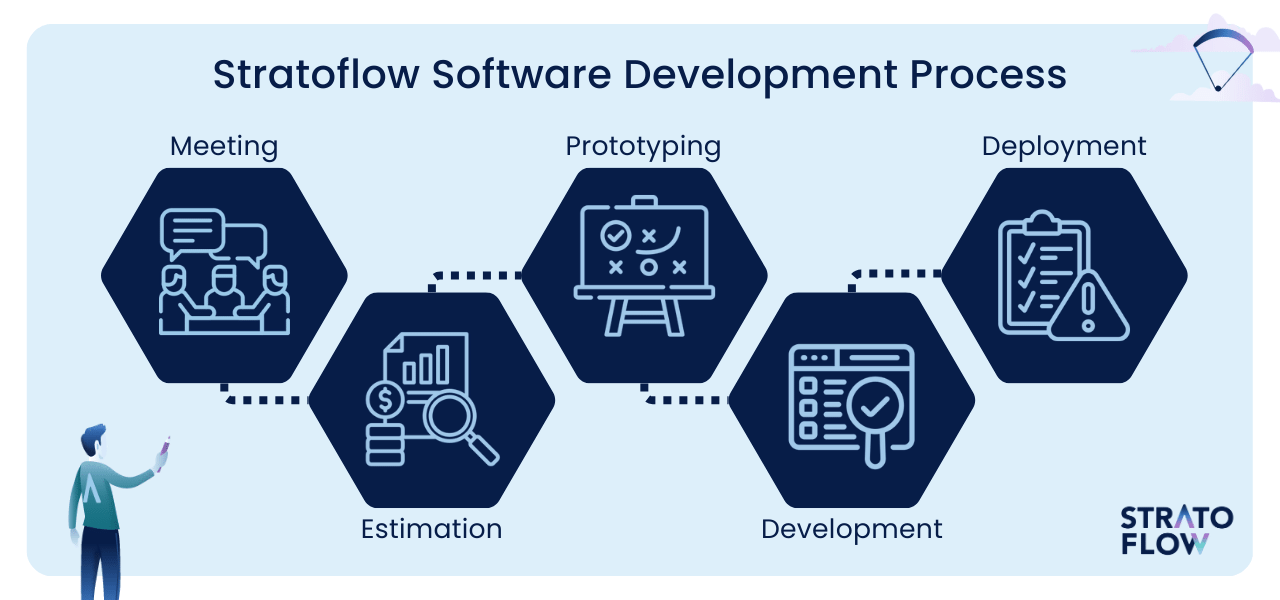
We use the Openkoda platform to enhance our development process, combining its powerful pre-built templates with our extensive knowledge and experience.
This allows us to deliver custom property management software faster and more efficiently.
Openkoda’s flexibility and scalability, coupled with our ability to customize and integrate additional functionality, ensures that we can meet the specific needs of each client, providing the perfect mix of scalability, performance and future-proofing.
We are a real estate tech company that is committed to using the latest technologies and best practices to create robust, user-friendly software that improves operational efficiency and tenant satisfaction.
We specialize in developing custom real estate software solutions like:
- Building Management Systems (BMS)
- Property Maintenance Software
- HOA Management Software Solutions
- Real Estate ERP Software Solutions
Whether it’s integrating advanced features like AI-driven maintenance management and dynamic pricing tools, or ensuring compliance with local regulations, we tailor our solutions to meet the unique needs of your business.
If you are planning to develop your own custom property management software solutions, we encourage you to contact us.
Our expertise and the powerful capabilities of the Openkoda platform make us the ideal partner to help you achieve your goals and drive your business forward.
Related Posts
- How to Build an Inventory Management System: Key Steps and Tips
- How to Build a Document Management System: Alternative Approach
- Best Real Estate CRM Software in 2025
- Online Shopping Recommendations – Introducing Them to Your Business
- Amazon Product Recommendation System: How Does Amazon Algorithm Work?
Thank you for taking the time to read our blog post!
